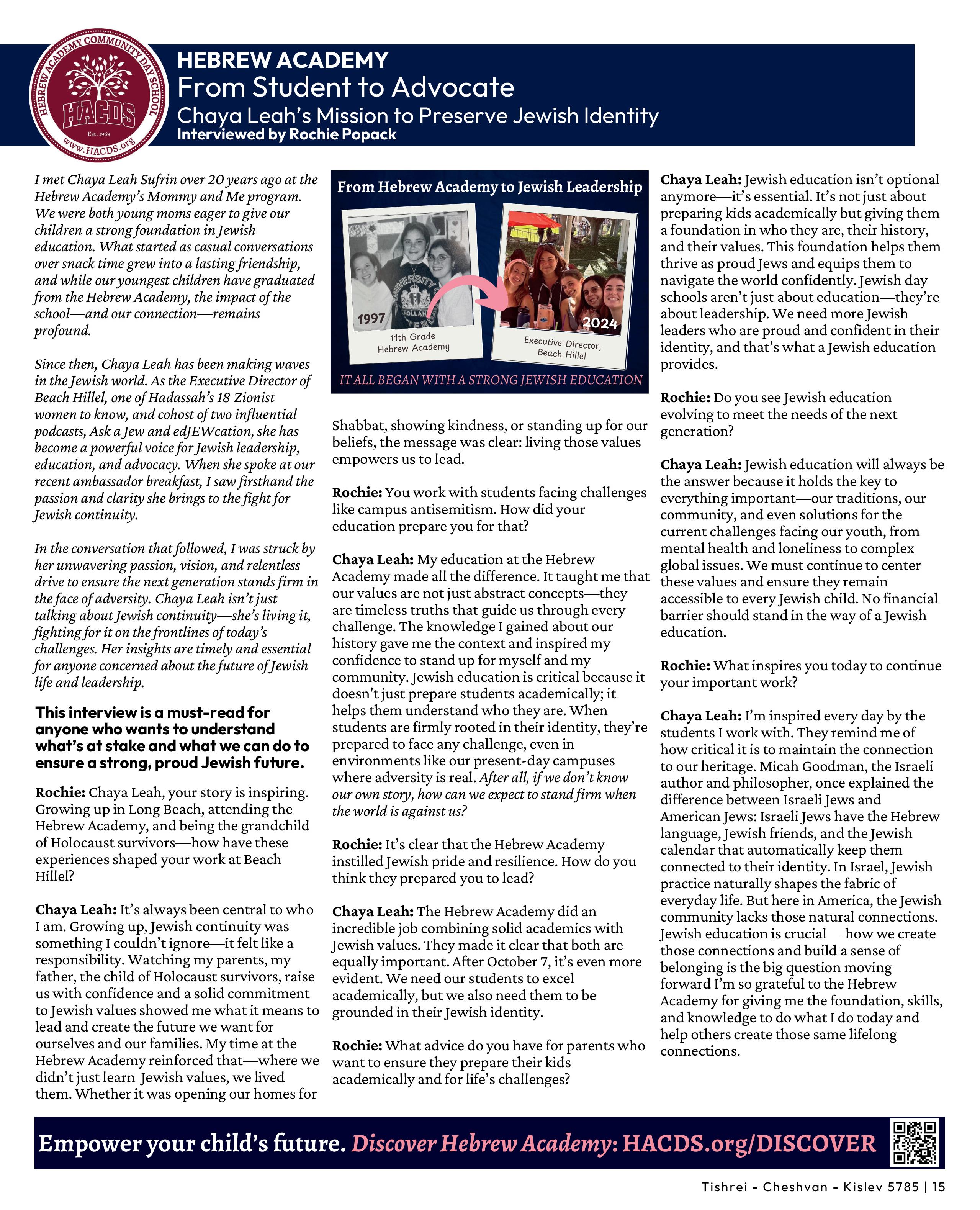
5 minute read
Hebrew Academy
From Student to Advocate: Chaya Leah’s Mission to Preserve Jewish Identity
Interviewed by Rochie Popack
I met Chaya Leah Sufrin over 20 years ago at the Hebrew Academy’s Mommy and Me program. We were both young moms eager to give our children a strong foundation in Jewish education. What started as casual conversations over snack time grew into a lasting friendship, and while our youngest children have graduated from the Hebrew Academy, the impact of the school—and our connection—remains profound.
Since then, Chaya Leah has been making waves in the Jewish world. As the Executive Director of Beach Hillel, one of Hadassah’s 18 Zionist women to know, and cohost of two influential podcasts, Ask a Jew and edJEWcation, she has become a powerful voice for Jewish leadership, education, and advocacy. When she spoke at our recent ambassador breakfast, I saw firsthand the passion and clarity she brings to the fight for Jewish continuity.
In the conversation that followed, I was struck by her unwavering passion, vision, and relentless drive to ensure the next generation stands firm in the face of adversity. Chaya Leah isn’t just talking about Jewish continuity—she’s living it, fighting for it on the frontlines of today’s challenges. Her insights are timely and essential for anyone concerned about the future of Jewish life and leadership.
This interview is a must-read for anyone who wants to understand what’s at stake and what we can do to ensure a strong, proud Jewish future.
Rochie: Chaya Leah, your story is inspiring. Growing up in Long Beach, attending the Hebrew Academy, and being the grandchild of Holocaust survivors—how have these experiences shaped your work at Beach Hillel?
Chaya Leah: It’s always been central to who I am. Growing up, Jewish continuity was something I couldn’t ignore—it felt like a responsibility. Watching my parents, my father, the child of Holocaust survivors, raise us with confidence and a solid commitment to Jewish values showed me what it means to lead and create the future we want for ourselves and our families. My time at the Hebrew Academy reinforced that—where we didn’t just learn Jewish values, we lived them. Whether it was opening our homes for Shabbat, showing kindness, or standing up for our beliefs, the message was clear: living those values empowers us to lead.
Rochie: You work with students facing challenges like campus antisemitism. How did your education prepare you for that?
Chaya Leah: My education at the Hebrew Academy made all the difference. It taught me that our values are not just abstract concepts—they are timeless truths that guide us through every challenge. The knowledge I gained about our history gave me the context and inspired my confidence to stand up for myself and my community. Jewish education is critical because it doesn't just prepare students academically; it helps them understand who they are. When students are firmly rooted in their identity, they’re prepared to face any challenge, even in environments like our present-day campuses where adversity is real. After all, if we don’t know our own story, how can we expect to stand firm when the world is against us?
Rochie: It’s clear that the Hebrew Academy instilled Jewish pride and resilience. How do you think they prepared you to lead?
Chaya Leah: The Hebrew Academy did an incredible job combining solid academics with Jewish values. They made it clear that both are equally important. After October 7, it’s even more evident. We need our students to excel academically, but we also need them to be grounded in their Jewish identity.
Rochie: What advice do you have for parents who want to ensure they prepare their kids academically and for life’s challenges?
Chaya Leah: Jewish education isn’t optional anymore—it’s essential. It’s not just about preparing kids academically but giving them a foundation in who they are, their history, and their values. This foundation helps them thrive as proud Jews and equips them to navigate the world confidently. Jewish day schools aren’t just about education—they’re about leadership. We need more Jewish leaders who are proud and confident in their identity, and that’s what a Jewish education provides.
Rochie: Do you see Jewish education evolving to meet the needs of the next generation?
Chaya Leah: Jewish education will always be the answer because it holds the key to everything important—our traditions, our community, and even solutions for the current challenges facing our youth, from mental health and loneliness to complex global issues. We must continue to center these values and ensure they remain accessible to every Jewish child. No financial barrier should stand in the way of a Jewish education.
Rochie: What inspires you today to continue your important work?
Chaya Leah: I’m inspired every day by the students I work with. They remind me of how critical it is to maintain the connection to our heritage. Micah Goodman, the Israeli author and philosopher, once explained the difference between Israeli Jews and American Jews: Israeli Jews have the Hebrew language, Jewish friends, and the Jewish calendar that automatically keep them connected to their identity. In Israel, Jewish practice naturally shapes the fabric of everyday life. But here in America, the Jewish community lacks those natural connections. Jewish education is crucial— how we create those connections and build a sense of belonging is the big question moving forward I’m so grateful to the Hebrew Academy for giving me the foundation, skills, and knowledge to do what I do today and help others create those same lifelong connections.










